- Home
- P. L. Gaus
Whiskers of the Lion Page 4
Whiskers of the Lion Read online
Page 4
Professor Branden returned from the kitchen with a new glass of water for Mrs. Dent. He set it on the coffee table in front of her, and he sat at the opposite end of the coffee table from Richard Dent. Catching Robertson’s eye, he asked Dent, “When did Howie get his car, Mr. Dent?”
Sullenly, Dent muttered, “Night before last. Monday night some time.”
“But was it evening or night?” Branden asked.
“Night. We were asleep.”
“Did he wake you up?”
“No. We just saw that his car was gone the next morning.”
“Why did you assume that he was the one who had taken it?”
“Who else?”
Branden shrugged, and Robertson said, “You might have thought it was stolen, Mr. Dent.”
Dent shook his head with certainty. “He came inside and got his spare keys from the back porch.”
Robertson stood. “Anyone could have taken the keys, Richard.”
Again Dent shook his head. He stood and led the men through the kitchen and out to the back porch. Behind a battered hutch with tall shelves that held canned goods and old magazines, he reached in with his hand and said, “See for yourselves. Other than us, Howie is the only person who knew where we hid the spare keys.”
Robertson took Dent’s place beside the hutch and felt blindly behind the shelves. “A nail for the keys,” he said to Branden, and he withdrew his hand.
Back in the living room, the three men stopped near the front door. Taking a sterner tone, Robertson asked Dent, “If you knew yesterday morning that your son had come for his car in the night, why didn’t you report that to us immediately?”
“Why?” Dent huffed. “It’s his car.”
“Because we would have gone out looking for him,” Robertson said with a mix of consternation and surprise.
Still clutching her clippings, Susan Dent stood up from the couch. “What? What about looking?”
Robertson turned to her. “If you had told us Howie was back in Holmes County, we would have looked for him, Mrs. Dent. Maybe we could have found him first.”
Stricken, Susan Dent looked first to Robertson and then to her husband. With tears spilling out onto her cheeks, she shrieked at Richard, “We killed our own son!” and then she stabbed a finger at him and cried out, “You should have told them!”
Fighting a rush of anger, Richard Dent turned on the sheriff. “Just what makes you think you could have found Howie before these people did? You haven’t been able to find anyone. You’ve had four months!”
“We could have tried,” Robertson said. “We might have had a chance, here. If we had known he had come home.”
Overwhelmed with grief, Susan doubled at the waist and dropped her clippings onto the carpet. Richard Dent went to her, but she pushed him away and sank to her knees. He looked impotently to Branden and then to Robertson, and said, “These clippings are from the Budget.” He tried to lift his wife to her feet.
She refused his efforts, choosing instead to lie weeping on the carpet between the sofa and the coffee table. Richard stood with a bewildered vacancy in his eyes and muttered, “She thinks she sees messages in the Budget.”
• • •
When they drove back toward the Helmuth farm, Robertson and Branden left Deputy Baker to tend to Mr. and Mrs. Dent. Branden briefly read some of the clippings as Robertson drove, and he said to the sheriff, “What have you tried, Bruce? To locate these two.”
“Nothing that worked,” Robertson said as he pulled into the Helmuth drive.
“But what?” Branden insisted.
Rolling toward the house, Robertson answered, “Greyhound bus records, credit cards, Howie’s phone records. Plus road patrols in Holmes County, places they might go, like motels and restaurants. And Ricky made a couple of trips down to Memphis, to try to trace them after they got off the bus from Charlotte.”
As Robertson pulled up at the back of the house, Branden asked, “Do you have a likeness of Fannie?”
Robertson and Branden got out, and Robertson said over the top of his Crown Vic, “We put together a composite sketch. It looks just like her.”
Branden followed Robertson to the back door, where the cables from the gasoline generator snaked up the steps into the house. Robertson hesitated there as if perplexed.
So they could talk above the growl of the generator, Branden pulled the sheriff back twenty yards toward the barn and said, “We’re going to have to do better, Bruce. Finding Fannie Helmuth has got to be the first priority, now.”
Robertson kicked angrily at the gravel where they stood and said, “I should have anticipated this, Mike.”
“And what would you have done?” Branden asked. “Shown their pictures to everyone who enters Holmes County?”
“Something like that.”
“No. This is on the Dents, Bruce.”
Robertson glowered pent-up frustration at his friend. “It’s on me, Mike! I have to take the weight, here.”
Branden smiled a degree of concession, and Robertson spun away from him to walk off several paces toward the tall red barn. Branden followed and said, “OK, Bruce, you take the weight. But listen. Just listen.”
Robertson stopped and turned back on the wet gravel to face the professor with a menacing scowl, looking for all the world as if what he needed most right then was a purging fistfight.
The skies were overcast again, and a light rain began to fall. Robertson held to his exposed position, refusing to surrender any ground to Branden’s attempts at encouragement.
Branden held up a warding palm, stepped five more paces to gain shelter inside the barn, and turned back toward Robertson. “You’ve been on this for four months, Sheriff. How’d they find him in a single day?”
Some of the antagonism bled out of Robertson’s gaze. He joined Branden inside the barn, and the rain fell harder outside. “What do you mean?” the sheriff asked over the clatter of the rain on the barn’s metal roof.
Branden stepped closer. “Could the Molina crew have known exactly what day out of the last four months to come back here looking for Dent?”
“Too much of a coincidence,” Robertson sputtered.
“OK,” Branden continued. “Could the Molina crew have been here all along, looking for Dent right beside you? In your county, Bruce? Right under your nose, and you didn’t notice them?”
“We’d have noticed,” Robertson allowed as he lumbered out of his wet suit coat. “Somebody would have noticed them.”
Branden nodded. “And could the Molina crew have camped unnoticed out here at the farm, anticipating that this was the one place where Howie would eventually show up?”
Robertson started pacing a circle inside the barn, thinking new thoughts. To let the sheriff think, Branden stood to the side. When Robertson stopped pacing, Branden asked, “Do you see it?”
Robertson punched his palm. He faced Branden briefly and then with a smile, as if he were experiencing a degree of optimism for the first time that morning, he turned in place to face the big house.
When he turned back to the professor, he was purposefully composed. “OK, Mike. This changes it all around. I need to tell Missy. She might find something along these lines anyway, but I need to tell her while she’s still processing the basement.”
Then the sheriff marched across the gravel in the rain and climbed the block steps leading into the back of the house.
Before Robertson disappeared inside, Branden called after him from the barn. “Bruce, I’m going to read more of those clippings.”
5
Wednesday, August 17
2:05 P.M.
IT WAS cool in the Helmuths’ kitchen, and once Robertson had closed the door to the back porch, it was also quiet enough to talk over the noise of the generator outside. Still in his golfing outfit, Captain Newell stood near the sink reviewing ph
otographs on the back of a Nikon camera. He had been filling out the voucher slips for each new memory card of photos. Next to his elbow, on the green Formica countertop, there were three bags with memory cards already organized. To fill so many cards with data, Robertson realized, Newell’s team must have photographed every minute aspect of the farm’s circumstance and condition. Every corner, in every room, in all of the buildings.
Robertson stood beside Newell to watch a few photo images on the Nikon’s LCD display, and when Newell clicked out of the review, the sheriff asked, “Is there any sign of Fannie? Anything to indicate that she came here with Dent?”
Bobby Newell shook his head. “Nothing, Sheriff. And we’ve been through everything out here.”
Robertson leaned back against the counter. To no one in particular, he said, “Where is she?” Then he said to the captain, “If she came here with him, Bobby, she’s probably already dead. Or if he told them where to find her, she’s probably already dead.”
Newell set the Nikon carefully on the counter and turned to face the sheriff. “There’s no trace of her here, Bruce. And Missy says there’s very little to go on, down in the basement. We don’t have any reason to think she came here with Dent, and you shouldn’t assume the worst.”
“You’ve been down to the basement?”
“Yes, with Pat Lance. Taking photos.”
“Mike says he looks like he died hard.”
Newell nodded. “You wouldn’t believe.”
Frustrated, Robertson stepped to the top of the basement steps and called down to his wife. “Missy, I need to come down there.”
“Five minutes,” she called back, and the sheriff turned away from the steps. To Newell, he said, “Where’s Pat Lance?”
“I set her up with a team to search again through the little Daadihaus.”
“You’ve been through all of the main house?”
“Of course.”
Robertson acknowledged that with an arch of his brow and stood in place to think.
Newell returned his attention to the camera equipment and finished his record keeping concerning the memory cards. When he turned around, Robertson was staring out the window over the kitchen sink. Newell asked, “Are we doing anything about food?” and Robertson said, “Baker’s on it.”
From the basement, Missy called up. “OK, Bruce. You can come down.”
Robertson eyed Newell and asked, “You done with photos now, Bobby?”
“Yes, but Pat will have more from the Daadihaus.”
“OK,” Robertson said, “Mike’s got a theory. I need to see if it lines up with what Missy has found down there. But while I do that, maybe you could check on Mike. He’s reading clippings from the Sugarcreek Budget.”
“Why?” Newell asked.
As he took the steps to the basement, Robertson called back, “Susan Dent thinks there are messages for her in the letters.”
• • •
At the bottom of the basement steps, Robertson turned left toward floodlights that shined from atop tripods to illuminate the back corner behind the steps. Missy was standing in the middle of the light, waiting alone. At her feet, the body of Howie Dent was laid out straight on a black rubber body bag. His clothes were in tatters, and his exposed skin was a battleground of swollen puncture wounds. Robertson stopped at the edge of the light and stared. After a long and difficult hesitation, he said, “I’ve never seen anything like that.”
Missy said, “First, I want to show you what I found down here.” She pulled her husband into the corner where she had positioned a folding aluminum table on which she had laid out her evidence—bagged, sorted, and cataloged. She let the sheriff study the items. She waited for him to speak.
“Missy,” the sheriff said eventually, “you’ve got to be kidding.”
“I wish I were,” Taggert said, “but this is how he died.”
On the table, Taggert had arranged evidence bags in groups. One set of bags on the left held soft yellow latex gloves of the type that an emergency room doctor would use. Next to that were five bags, each containing either a 3 ml or a 5 ml plastic syringe with bloody, inch-long needles attached to the tips. Robertson sorted through the bags and noticed that one of the needles had been snapped off at the base. He held up the bag with a silent question in his eyes, and Missy answered, “I found the broken needle buried deep in his cheek, just under his right eye.”
Robertson returned the evidence bag to the table and moved on to the next items. In separate bags, there were bottles of Amish folk remedies. One was labeled CHILD CALMER and another was labeled TINCTURE OF IODINE. In a bag larger than the others, there was a flattened tube that had held BLEIB-RUHIG, FOR CALM HORSES. Robertson inspected the label and read the ingredients—dextrose, ethyl alcohol, ground limestone, potassium sorbate, sodium bentonite, sodium benzoate, sodium saccharin, thiamine hydrochloride, and finally, water and xanthan gum. When Robertson put the bag with the tube down, he stepped back from the table and said, “These are mostly empty.”
Missy turned her husband around to face the body of Howie Dent. “They shot it all under his skin, Bruce. They injected it while he was strapped to that post, and then I think they rubbed it in, so that it would hurt even more.”
Robertson shook his head and knelt beside the body. He looked first at the welt under Dent’s right eye, and then he studied the arms, torso, legs, and scalp.
Dent’s clothes had been shredded to expose his skin, and in the centers of ugly swollen patches, there were puncture wounds that had bled trails of red into the tatters of his clothes. Some of the swollen patches were fairly round in shape, and some were oblong, as if the needles had been sunk laterally under the skin and then withdrawn slowly, while the plunger was depressed, to deliver a line of chemical, for the most brutal effect. Once he had seen enough, Robertson pushed up and stepped back. He didn’t speak. Missy let him absorb the impact of the brutality, and then she said, “While he was still alive, Bruce, his skin would have felt like it was on fire. Not flames, but like a deep chemical burn. They might as well have cut him a thousand times and swabbed all the wounds with acid.”
Wearily, Robertson rubbed his sockets with the flats of his fingers. He shook his head and said, “He’d have told them anything they wanted to know, Missy.”
Missy smiled. “I’m not so sure.”
“Why in the world not?”
“Because I think he died of a heart attack.”
“During the torture?”
“Yes,” Taggert said. “I think one of these injections might have hit a vein. The poison could have gone right to his heart.”
“Then Fannie still has a chance,” Robertson said with a measure of satisfaction. “There’s a chance he didn’t talk.”
“I think so,” Missy said. “Everything down here tells me that they worked on him right up until that last injection. When he died, I think they dropped everything and walked out of here. He died suddenly, and they couldn’t do anything about it.”
“Is that why he smells like urine?”
Missy nodded. “His bladder released when he died.”
“Does Bobby Newell know this?” Robertson asked.
“I’ve told only you,” Missy said. “I just now finished with my preliminary exam. And I’ll have to wait for his autopsy. But I think I’m right.”
Robertson thought, frowned, and rubbed at his temples. “Maybe they got what they wanted from him, Missy, and they injected that vein on purpose. To finish him.”
“I’ll know more once I conduct his autopsy,” Taggert said.
The sheriff turned back to the evidence table. He made a brief study of the bagged items again and said, “This was all bought locally. Maybe in a harness shop. Or a health food store.”
“I think so,” Missy said. “Harness shop, tack shop, or something like that. Really, Bruce, anywhere in Amish country.�
�
“Then it fits,” Robertson said with cautious satisfaction.
Missy waited for an explanation, and Robertson said, “Mike has a theory. That it wasn’t the Molina outfit that did this.”
“But that’s who would have been looking for him,” Taggert argued.
“I know. But it’s improbable that they’d find Dent here so easily. So quickly.”
“I’d hate to think we had someone living locally who could do this sort of thing,” Missy said.
“It has to have been someone local, Missy. The Molinas can’t have put this all together that fast. Anyway, that’s Mike’s theory.”
“That’s the angle that I couldn’t figure,” Missy said. “I mean, how could they find him so quickly?”
“You have something that fits?”
Missy nodded. “There’s nothing wet down here, Bruce. Everything is dry, even his clothes. They didn’t bring him down here during the rains last night or yesterday afternoon.”
“It started raining yesterday around noon,” Robertson said. “And it rained most of the night.”
“I know,” Missy said. “So they had to have brought Dent down here before that.”
“I don’t know,” the sheriff said. “He might have been staying inside the house. Maybe he wouldn’t have been out in the rain, anyway.”
“Bobby says there’s no evidence of that, Bruce. He doesn’t think anyone was staying here. All he found was where Stan Armbruster tracked through the house this morning.”
Shaking his head, Robertson started for the stairs. At the base of the steps, he stopped, turned back, and asked, “You about done here?”
“Yes. The next step is to get him up the steps and into town.”
“I’ll send some people down to help carry him up,” the sheriff said. “But I want to talk to Branden and Armbruster. Also, to my captain. Because between taking his car sometime Monday night and the start of the rain around noon yesterday, Howie Dent went somewhere local—the wrong somewhere local—and that’s what got him killed.”

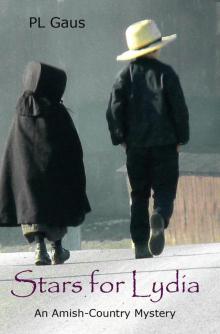 Stars for Lydia
Stars for Lydia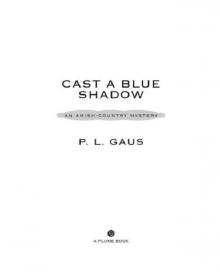 Cast a Blue Shadow
Cast a Blue Shadow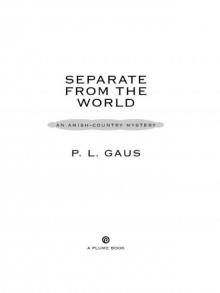 Separate from the World
Separate from the World Clouds without Rain
Clouds without Rain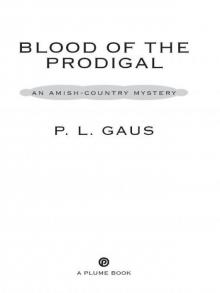 Blood of the Prodigal
Blood of the Prodigal Whiskers of the Lion
Whiskers of the Lion A Prayer for the Night
A Prayer for the Night Broken English
Broken English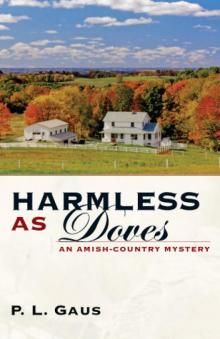 Harmless as Doves: An Amish-Country Mystery
Harmless as Doves: An Amish-Country Mystery